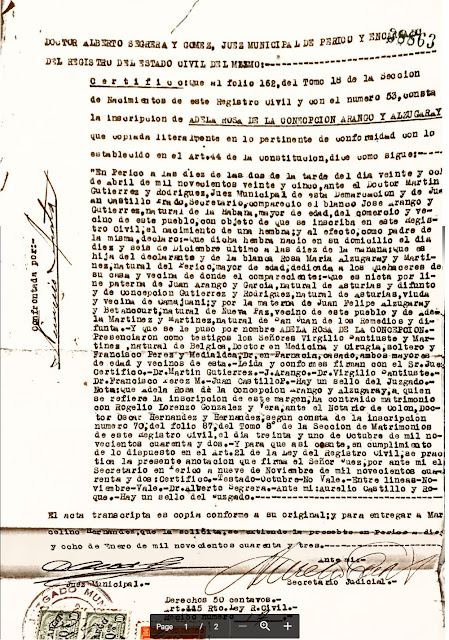Introduction
Hola, Amigos y Amigas!
I have never had a blog before, so this is a new adventure!
Although I've been a genealogist for 53 years, during the past year and a half, I have learned a great deal about doing genealogical research (long distance!) in Cuba. Especially about what NOT to do!
My knowledge about Cuban research began with joining the Cuban Genealogy/Genealogía Cubana group at Facebook. https://www.facebook.com/groups/268579533222473/. The wonderful folks there helped me to find some researchers on the Island, and these in turn, helped me to understand what is and what is not available. When I began, I didn't think it was possible to obtain ANY information from Cuba, but I've since learned that much is available if you know where and how to ask for it.
So, with a push from one of the members, I've started this blog as a place to share some of knowledge I've picked up since January 2018. So to begin:
Cuba is not like the US where you can walk into a registry office and walk out with a birth, marriage or death certificate. Often it takes a long time to obtain these documents - sometimes even months. Why? For several reasons, but primarily because the average government-set wage in Cuba is about $20 per month. So the employees at the registry offices are not particularly motivated to work particularly hard, if at all.
For this reason, researchers prefer to go to churches where they can (usually) find baptism, marriage, and burial records fairly easily, especially if the location where your ancestor lived is a small city or town.
Please be sure to give the researcher a very specific task: For example: “I want the baptismal record of Jose Fulano Anybody, who was born on July 12, 1889 in __________." If the event occurred in Havana, you will need to know the municipality within the city where the event occurred. There are 15 municipalities, each with its own registry office. There is no central records repository for the whole city.
Never say, “Please send me everything you can find on the Fulano family!” You will only ruin your credibility and waste the researcher’s time. When you contact a researcher, ask him/her to set your expectations for when you might receive your document.
Here are two examples of records you might be able to obtain:
The first is an official birth record from the Registry Office in Perico, Matanzas Province.
More later!
I have never had a blog before, so this is a new adventure!
Although I've been a genealogist for 53 years, during the past year and a half, I have learned a great deal about doing genealogical research (long distance!) in Cuba. Especially about what NOT to do!
My knowledge about Cuban research began with joining the Cuban Genealogy/Genealogía Cubana group at Facebook. https://www.facebook.com/groups/268579533222473/. The wonderful folks there helped me to find some researchers on the Island, and these in turn, helped me to understand what is and what is not available. When I began, I didn't think it was possible to obtain ANY information from Cuba, but I've since learned that much is available if you know where and how to ask for it.
So, with a push from one of the members, I've started this blog as a place to share some of knowledge I've picked up since January 2018. So to begin:
Cuba is not like the US where you can walk into a registry office and walk out with a birth, marriage or death certificate. Often it takes a long time to obtain these documents - sometimes even months. Why? For several reasons, but primarily because the average government-set wage in Cuba is about $20 per month. So the employees at the registry offices are not particularly motivated to work particularly hard, if at all.
For this reason, researchers prefer to go to churches where they can (usually) find baptism, marriage, and burial records fairly easily, especially if the location where your ancestor lived is a small city or town.
Please be sure to give the researcher a very specific task: For example: “I want the baptismal record of Jose Fulano Anybody, who was born on July 12, 1889 in __________." If the event occurred in Havana, you will need to know the municipality within the city where the event occurred. There are 15 municipalities, each with its own registry office. There is no central records repository for the whole city.
Never say, “Please send me everything you can find on the Fulano family!” You will only ruin your credibility and waste the researcher’s time. When you contact a researcher, ask him/her to set your expectations for when you might receive your document.
Here are two examples of records you might be able to obtain:
The first is an official birth record from the Registry Office in Perico, Matanzas Province.
Below is a baptismal certificate showing date of birth, place of baptism, parents, birth places of parents, names of grandparents!
More later!



Comments
Post a Comment